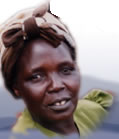THEMES IN THIS
TESTIMONY
History

Social Relationships

Click on arrows
to find more
testimonies
featuring
these themes
|
|
Sex
|
Male
|
|
|
Age
|
90
|
|
|
Identity
|
Sabaot
|
|
|
Occupation
|
Retired court judge
|
|
|
Location
|
Chepkarai
|
|
|
Date
|
27 November 1996
|
|
summary
This is another interview with Samuel Naibei Kimkung, but carried out by a different interviewer. Indeed the testimonies are so different it’s hard to believe that it is the same narrator. This could be not only due to the variation on the questions, but also to the difference in the interviewers themselves (different sex and personality) and accordingly Samuel’s reaction to them. Unfortunately the text in this interview is very unclear at times, and this could be highlighting a further difference: poor translation. Despite this, there is some interesting information here that complements the original.
The narrator has vivid reminiscences of the past, and expresses his disapproval of what he sees as the contemporary lack of leadership and the disrespect of the young for the older generation and their ways. This interview, like so many others in the collection, highlights a strong ambivalence to education. Indeed, on the one hand Samuel attributes his career as a judge to the fact that he was one of the first educated people in the area, and he encourages the young to study, as he sees education as a privilege of independence from the colonialists: “You should study hard, you are the free people.” On the other hand, he blames education for the lack of leadership and the “straying” of the young.
detailed breakdown
|
You will need a password from Panos to view the full
transcript of the interview. To apply for a password, click here.
Once you have a password, click here to go to the beginning
of the transcript. You can also click on any section of the
breakdown of content below and go straight to the
corresponding part of the transcript.
|
| Section 1 |
Personal details.
|
| Section 2 |
In colonial time Sabaot were likened to Maasai.
Pre-colonial and colonial history of settlements in the area.
|
| Section 3-4 |
Employment history – how narrator became a chief’s clerk and then a judge because he was one of the first literate people in the area. Kiswahili was the language used because of tribal diversity: “We used Kiswahili because there were Bukusu, Teso, every tribe. And what brought us together was Kiswahili.”
|
| Section 4-5 |
Past definition of intelligence: “Intelligence follows a family lineage”. How those who were in positions of power, were there because of their “inborn intelligence”. Link between intelligence and “community respect”.
|
| Section 6 |
The narrator’s family is well known in the area because have had many chiefs amongst them.
|
| Section 6-7 |
The importance of medicine men and their visions, during past warfare.
|
| Section 8-9 |
Decline of laibon and old customs because of Christian religion. Believes that this has adversely affected the current methods of leadership and power: “Now they just elect a person through bribery. Not out of respect. Just bought with money. I see people uneasy with the leadership; they fall, and spoil the development agenda.” How in the past people were elected to power because of community respect and “inborn intelligence”. Different to today and the intelligence acquired by education. Narrator believes that just because someone went to university, doesn’t mean that they can lead. This is linked to what the narrator sees as the current lack of respect for elders, the lack of leadership, and the decline in the community’s role of disciplining the young.
“...People despise the people of old. They despise even father and mother. A child has no respect for his father and mother. That is what is spoiling this nation these days.... There is now no leadership, there is no leadership anymore...”.
|
| Section 10-13 |
Educational history. The first teachers in the region were Bukusu. Describes how, on the chief’s orders, he and other children were forcibly taken to school against his father’s wishes.
First Christian preacher in the area. First white man to reside in the area.
Political and tribal considerations influenced choice of school location.
|
| Section 14 |
History of taxes. Impact of hut taxes on marriage patterns: less polygamy as tax had to be paid on each wife’s hut.
|
| Section 15-18 |
Colonial and post-colonial politics and the struggle for Independence: the gift of freedom for the younger generation.
|
| Section 18-19 |
Describes how exceptional age and wisdom can lead to a woman being treated as though she were a man.
Introduction of alcohol to the regions by Ugandan Nubians.
|
| Section 19-21 |
How the narrator feels that the promiscuity of the young is ‘spoiling the country’. Customary methods of support for unmarried pregnant women. Feels that education compounds the ‘moral looseness’ of girls by discouraging them to marry.
|
|


